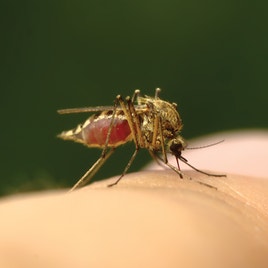Some People Are Simply More Attractive (to Mosquitoes)!
May 4, 2015
Genetic differences between humans help determine why mosquitoes appear to prefer the scent of some people over others, according to scientists at the London School of Hygiene and Tropical Medicine. The research may explain why some people can be eaten alive by mosquitoes while their companions remain untouched. The results were published last week in the online journal PLOS One.

Recent research shows that mosquitoes have preferences about which humans to feed upon based on genetic factors in humans. © Dmitry Knorre, Dreamstime
More than 3,000 species (kinds) of mosquitoes live worldwide. Only female mosquitoes bite, and only a few species attack humans. They sip the victim’s blood, which they need for the development of their eggs, usually leaving an itchy welt. However, certain mosquitoes spread some of the world’s worst diseases, including dengue, encephalitis, malaria, and yellow fever. Scientists know that mosquitoes locate their victims through smell, but they do not understand why some people are bitten more than others.
The London scientists observed 37 sets of twins in an experiment to test the attractiveness of skin odors to captive populations of Aedes aegypti, an aggressive species of mosquito known for its fondness for human blood. Each twin placed one hand into one side of a Y-shaped glass tube as 20 hungry mosquitoes were released into the far end of the tube. The shape of the tube allowed each mosquito to fly toward the hand with a scent they preferred and away from a hand they disliked. A screen prevented the mosquitoes from actually biting the subjects. The scientists ran 40 trials with each set of twins to determine if the mosquitoes favored one twin over another or if they favored or disliked both twins equally.
The scientists observed that the mosquitoes often had a clear preference or clear dislike of certain subjects. However, the experiments showed that the overlap in the mosquitoes preference or dislike was about double among identical twins than it was for fraternal twins. Since identical twins share 100 percent of their genetic makeup compared to fraternal twins, who share only about half their genetic makeup, the researchers determined a person’s degree of mosquito attractiveness is determined by their genes.
The experiment demonstrates that some people have genetic makeups that are more attractive to mosquitoes than others. In addition, scientists saw that some people also seemed to have genetic makeups that are naturally repellant to mosquitoes. The researchers know that genetic makeup has a role in a person’s individual body odor. However, many other factors, including diet and the billions of bacteria that make up a person’s microbiome (the microbes that live on and in a human body), contribute to that odor. The scientists hope to learn exactly what factors are responsible for skin odors that mosquitoes dislike in order to produce more effective mosquito repellants.
Other World Book articles:


